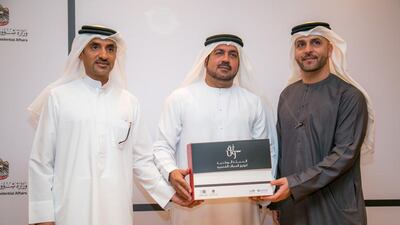ABU DHABI // Do you have the birth certificate of a high-profile Emirati relative? A vintage family photo, perhaps? Or an old film of a significant historic event? Then archiving experts want to hear from you.
The National Archives organisation has launched a campaign to collect copies of rare and important documents to create a record of the nation’s history – and researchers will pay for noteworthy items.
Their value will be determined by a committee, but Dr Abdullah Al Rayes, director general of the National Archives, expects most families will be happy to donate.
“Who doesn’t want to be part of the national history?” he said. “Wouldn’t you be proud of your history being published online through the National Archives, that you belong to this country?”
About 250,000 small containers will be distributed to Emirati families, with a USB drive and instructions for storing personal historical documents.
“There are tons of documents with individuals in the UAE, either expats or UAE nationals, and these documents are getting lost,” said Dr Al Rayes.
“The campaign empowers people to create their personal archives and preserve historical documents, records, artefacts and other precious possessions that are a pivotal reservoir of information about life within UAE society,” said Dr Al Rayes.
“Therefore, we must safeguard these valuables to make them accessible to the public, while educating people about the numerous intellectual, cultural and historical benefits of our archives.”
The agency stores the records of about 200 government agencies and departments. It has about five million historical documents dating from before the federation, but most of these are from British, Dutch and Portuguese sources. Personal family records of Emiratis living in the UAE are “very few”.
“We can say in the thousands,” said Dr Al Rayes. The new campaign aims to dramatically increase that number.
Emirates Post will begin sending text messages next month to its Emirati customers advising them to pick up the free storage boxes.
“We will call them to come to the post offices to collect the box and to start archiving all their information and important documents, pictures, photos, you name it,” said Ibrahim bin Karam, chief executive of Emirates Post.
“If they need more than one box, we’ll be more than happy to assist them because our strategy is to ensure each family receives a box to start archiving their documents.”
The storage containers may also be collected at the National Archives. Families are being asked to scan digital copies of their original records, save the files to the USB drive that comes with the box and deliver it to the National Archives.
Families who don’t have the scanning equipment can take their records directly to the National Archives, where they will be converted to digital files.
People can designate their items private or public. Public documents will be published on the National Archives’ website, and private documents will be accessible only by the family.
Abu Dhabi Media, publishers of The National, will produce two documentaries on the project and publicise it through its media outlets and on social media.
“It is crucial to not only record and preserve the memories of our nation, but also to consciously relive and learn from the lessons of history,” said Abdulraheem Bateeh, executive director of communication and government relations at ADM.
Phase two of the programme, expected in about six months, will target historical documents held by expatriates.
rpennington@thenational.ae

